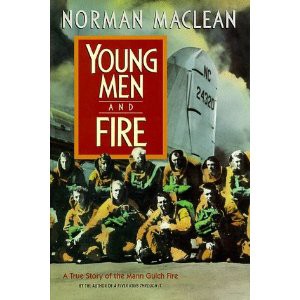Really Good Books You Could Spend Your Allowance On: Part One

There’s no point in telling you about the best books, because you’ve either read them, or you know you should.
Instead, in no particular order, here are a selection of books that are neither completely obscure nor reliably familiar. They are also excellent and generally modern-ish and North American-y. (If you want a list of eighteenth century travel literature or non-Shakespearean Renaissance drama, I can also hook a girl up.)
Young Men and Fire, Norman Maclean — I lied. This is actually the best book there is. There are no better works of narrative non-fiction. It is very different and very lovely and very sad, and it’s a little like reading Into Thin Air or Into the Wild, if they had been written by Alice Munro instead of by a very serviceable journalist.
Shot in the Heart, Mikal Gilmore — Better and less contrived than The Executioner’s Song, and closer to the source.
Starplex, Robert Sawyer — You know how all the aliens in Star Trek look basically humanoid? (The occasional glow-y blob-y thing notwithstanding?) One of the alien races in “Starplex” is described as looking like a watermelon sitting in a wheelchair. All of Sawyer’s stuff is great.
Saint Maybe, Anne Tyler — Anne Tyler gets unfairly ghettoized as middlebrow ladyfiction. This is a fantastic novel.
Low Life: Lures and Snares of Old New York, Luc Sante — If you live downtown, you owe it to all the 19th-century immigrants you’ve built Teany on top of to read this.
Collected Poems, Philip Larkin — Larkin is the greatest poet of the twentieth century, depending on how you feel about Eliot and Auden. And Ashbery, Stevens, Bishop, Wright, Heaney. O’Hara! Poetry is wonderful, is what I’m saying.
Girls Like Us: Carole King, Joni Mitchell, Carly Simon — and the Journey of a Generation, Sheila Weller — Seriously. Buy a floppy hat, put some flowers in a vase and cue up “Tapestry.” And do not date Jackson Browne. Really. Even if he wrote “These Days.”
Dangerous Visions, ed. Harlan Ellison — The ur-text. If my recommendations seem occasionally SF-weighted, that’s because I feel very strongly that these authors are under-weighted in the culture, and under-recognized for their early acceptance of differing sexualities and anti-racism and ladies who ride dragons.
Birthday Letters, Ted Hughes — I’m sorry that Sylvia Plath killed herself, but if only one of them could survive and write about the other, I’m glad it was weird, druidic, moody Ted.
Fifth Business, Robertson Davies — Kind of a Canadian Great Gatsby. But better, because Gatsby isn’t even the best Fitzgerald. (It’s obviously This Side of Paradise.)
Borderliners, Peter Høeg — Høeg writes the most marvelously twisted things. And there would have been no Lisbeth without Smilla.
Too Bright to See / Alma, Linda Gregg — Poets write divorce porn too, and sometimes it’s remarkably beautiful. If your marriage has to fail, do it in Greece. For his side of the story, wait until March and read Jack Gilbert’s Collected Poems.
Headhunter, Timothy Findley — Paranoid schizophrenic with magical powers releases Kurtz from Heart of Darkness, he rules a dystopian Toronto. That old story.
The Left Hand of Darkness, Ursula K. Le Guin — Generally, any book that wins both the Hugo and the Nebula should change your life. This is no exception. Also, her Earthsea series.
Jesus’ Son, Denis Johnson — When Johnson won the National Book Award for Tree of Smoke, some people suggested it was like Scorsese finally winning for “The Departed.” Those people were sort of right.
The Nimrod Flipout, Edgar Keret — Keret is an Israeli who writes some of the most interesting and bizarre short stories you’re likely to encounter. He also gave a tremendously fascinating interview to The Believer, which you must immediately read.
Nova, Samuel Delany — My father tried to name me “Nova” after this. My mother shot him down. After I read it, I wished she hadn’t.
Part Two to follow on Tuesday.